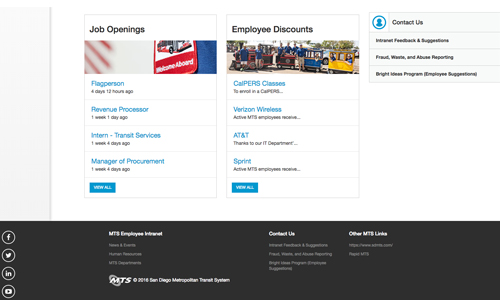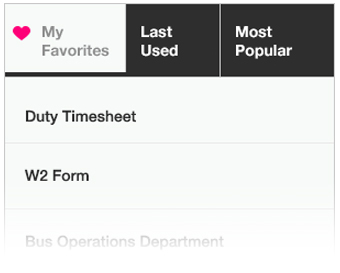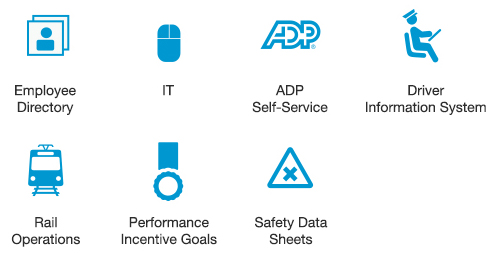You are here
Report from Sacramento - AB 805 and SB 1
Recent activity in the California State Legislature will have a lasting impact on MTS operations and how our agency is governed.
At a Glance:
Assembly Bill (AB) 805 has been approved by the State Assembly and is now being considered by the Senate. If signed into law later this year, the bill would change the makeup of the MTS Board and give MTS authority to introduce transit tax
measures to voters.
Senate Bill (SB) 1 was approved by both the Assembly and Senate and signed into law by Governor Jerry Brown on April 28, 2017. SB 1 creates a new $5.24 billion funding stream for infrastructure repairs for roads, bridges, highways and transit.
A Detailed Look at Both Bills:
AB 805
At the MTS Board’s March meeting, the Board directed staff to seek legislation that would allow MTS to ask voters to approve a tax for transit operations in the cities our system serves. AB 805 includes authorization for MTS to levy up to a half-cent sales tax for transit purposes serving the MTS jurisdiction.
AB 805 would also make substantive changes to MTS, SANDAG, and NCTD governance and voting structures. The bill is working its way through various committees in Sacramento. The full Assembly approved AB 805, and is now in the Senate for consideration. If approved by the Senate, it would then go to the Governor’s office for consideration by the end of the year. The MTS Board has taken a position to support AB 805 along with the City of Lemon Grove. Some cities in MTS’ jurisdiction
have taken positions of opposition including Poway, Coronado, La Mesa, El Cajon and National City.
Some elements of the bill could change, but as it stands now, key changes MTS employees would see are:
- The Mayor of San Diego would sit on the MTS Board.
- The City of Chula Vista would get a second seat on
- the MTS Board.
- The Board chair would have to be an elected sitting member
- of the Board (Currently, Harry Mathis, a former San Diego
- City Councilman was appointed the chair. His term expires
- at the end of the year.
- MTS could ask the public within the nine cities and unincorporated areas of the County (i.e. Spring Valley, Alpine and Jamul) to approve up to a ½ cent sales tax for transit-related projects.
SB 1
The Road Repair and Accountability Act of 2017(SB 1) is a $52 billion transportation package that was signed by Governor Jerry Brown on April 28, 2017. The revenues generated from this legislation will provide a significant boost in funding for California’s infrastructure, and public transit will benefit as well. SB 1 will fund a myriad of infrastructure-related improvements such as:
• State highways - $1.5 billion annually
• Local streets and roads - $1.5 billion annually
• Public transportation - $750 million annually
• Trade corridor enhancements - $300 million annually
• Transit and intercity rail capital project and
operations - $27.5 million annually
To fund the transportation package, gas prices will increase by 12 cents per gallon, and there will be an excise tax on diesel fuel of 20 cents per gallon. Electric cars owners will start paying registration fees - $100 annually, and all car owners will have to pay an additional annual vehicle fee.
According to the California Transit Association, the $5.24 billion/ year funding measure contained in SB 1 generates new revenue for public agencies developing transportation projects and
services. Through a combination of formula-based allocations and competitive grant programs, SB 1 would generate between $600 million and $900 million annually in new funding for public transit.
What does SB 1 mean to MTS?
“We estimate to get approximately $20.5 million annually in new funding from SB 1,” said Sharon Cooney, MTS chief of staff.
“There’s also a $600 million/year pot of money for discretionary grants for which MTS will compete. Staff is analyzing the impact of this legislation and will present options to the Board to plan for
the investment of these new revenues.”
Note: MTS is being very cautious in its approach to using these funds. There is a chance that this measure could be replaced or repealed through a citizen’s initiative

 Employee Directory
Employee Directory IT Help Desk
IT Help Desk ADP Self-Service
ADP Self-Service Driver Information System
Driver Information System Bus Operations
Bus Operations Rail Operations
Rail Operations Performance Incentive Program
Performance Incentive Program Safety Data Sheets
Safety Data Sheets



